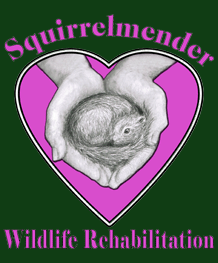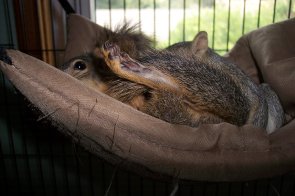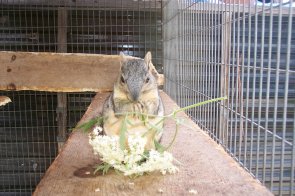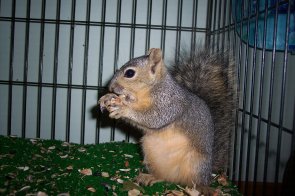
- Home
- Helping Wildlife
- Important Rescue Info!
- Found A Baby Squirrel?
- Found A Juvenile Squirrel
- Found Adult Squirrel
- How to Rescue Wildlife
- Handling Wildlife
- What About Rabies
- Dead Wildlife
- Find a Rehabber
- Make a Donation
Every dollar donated to Squirrelmender Wildlife Rehabilitation goes directly to the care of wildlife providing food, medical supplies and housing for the hundreds of animals that come through here.
Donate NOW
Squirrelmender Wildlife Rehabilitation
330 Charro AvenueAddress
Thousand Oaks, CA
91320
A tax-exempt, non-profit permitted by the California Department of Fish and Game.
Phone:805-498-8653
E-mail:
We also accept online donations through Network for Good.

Thousand Oaks, CA 91320
phone: 805-498-8653
cell: 805-338-0481
Adult Squirrels
|
Emergency Procedures If You Found An Adult Injured Squirrel The symptoms of head trauma are very similar to those of poisoning and the quicker the animal can be seen by a rehabber the better. Some symptoms of head trauma: listing to the side - walking in circles - looking and acting dizzy - blood from nose or mouth. Some symptoms of poisoning: listing to the side - walking in circles - looking and acting dizzy - blood from nose or mouth. If the squirrel is hurt: Handle with caution - squirrels have very long sharp teeth and strong jaws. While they are not at all aggressive by nature, injury places them in a defensive state and they may claw or bite to avoid capture. Leather gloves offer some protection but a good bite will puncture leather gloves or at least bruise you. Other trapping and capturing techniques - a box or a cage. Some small animal cages detach from the base and are useful for quickly placing over an injured animal - then a flat cookie sheet can be slid under the animal. Place soft cloths on the base of the cage and slip the cookie sheet out - landing the squirrel in the base. Squirrels calm down in the dark so cover the cage with a cloth that will make it dark within.
You can help us! |
   |